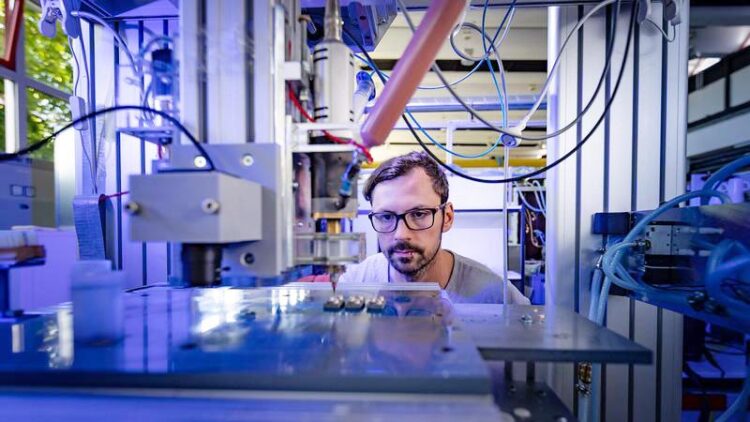Temperature-Resistant Power Semiconductors From a 3D Printer

Johannes Rudolph, research associate at the Professorship of Electrical Energy Conversion Systems and Drives at Chemnitz University of Technology, observes the 3D printing of housings for power electronic components.
Bild: Jacob Müller / TU Chemnitz
Researchers at the Faculty of Electrical Engineering and Information Technology at Chemnitz University of Technology have succeeded for the first time in 3D printing and subsequent sintering of housings for power electronic components.
Researchers at the Professorship of Electrical Energy Conversion Systems and Drives at Chemnitz University of Technology have succeeded for the first time in 3D printing housings for power electronic components that are used, for example, to control electrical machines. During the printing process, silicon carbide chips are positioned at a designated point on the housing.
As with its printed motor made of iron, copper and ceramics, which the professorship first presented at the Hannover Messe in 2018, ceramic and metallic pastes are also used in the 3D printing of the housings. “These are sintered after the printing process, together – and this is what makes them special – with the imprinted chip,” says Prof. Dr. Ralf Werner, head of the Professorship of Electrical Energy Conversion Systems and Drives. Ceramic is used as an insulating material and copper is used for contacting the gate, drain and source areas of the field-effect transistors. “Contacting the gate area, which normally has an edge length of less than one millimeter, was particularly challenging,” adds Prof. Dr. Thomas Basler, head of the Professorship of Power Electronics, whose team supported the project with initial functional tests on prototypes.
Following the ceramic-insulated coils printed at Chemnitz University of Technology, which were presented at the Hannover Messe in 2017, and the printed motor, drive components that can withstand temperatures above 300 °C are now also available. “The desire for more temperature-resistant power electronics was obvious, because the housings for power electronic components are traditionally installed as close as possible to the engine and should therefore have an equally high temperature resistance,” says Prof. Werner.
A research team led by Johannes Rudolph, who helped develop the 3D printing process, produced several prototypes of the additively packaged silicon carbide-based power semiconductors in recent months. “In addition to excellent temperature resistance, this technology offers other advantages,” Rudolph said. The scientists expect the two-sided, flat and solder-free contacting of the chips to result in a longer service life in terms of the number of load cycles, as well as better cooling and thus usability of the chips. “Due to the higher thermal conductivity of ceramics compared to plastics and the design freedom common to 3D printing, it is easy to realize specially adapted cooling geometries in the housing and on its surface,” assures Rudolph. In addition, only a single work step is required to manufacture a power electronic component after production of the silicon carbide chips themselves.
Johannes Rudolph and his team want to further develop the process to market maturity. Potential cooperation partners are welcome to participate, for example in joint research projects.
Wissenschaftliche Ansprechpartner:
Johannes Rudolph, tel. 0371 531-38938, e-mail johannes.rudolph@etit.tu-chemnitz.de
Weitere Informationen:
Media Contact
All latest news from the category: Power and Electrical Engineering
This topic covers issues related to energy generation, conversion, transportation and consumption and how the industry is addressing the challenge of energy efficiency in general.
innovations-report provides in-depth and informative reports and articles on subjects ranging from wind energy, fuel cell technology, solar energy, geothermal energy, petroleum, gas, nuclear engineering, alternative energy and energy efficiency to fusion, hydrogen and superconductor technologies.
Newest articles

Properties of new materials for microchips
… can now be measured well. Reseachers of Delft University of Technology demonstrated measuring performance properties of ultrathin silicon membranes. Making ever smaller and more powerful chips requires new ultrathin…

Floating solar’s potential
… to support sustainable development by addressing climate, water, and energy goals holistically. A new study published this week in Nature Energy raises the potential for floating solar photovoltaics (FPV)…

Skyrmions move at record speeds
… a step towards the computing of the future. An international research team led by scientists from the CNRS1 has discovered that the magnetic nanobubbles2 known as skyrmions can be…





















